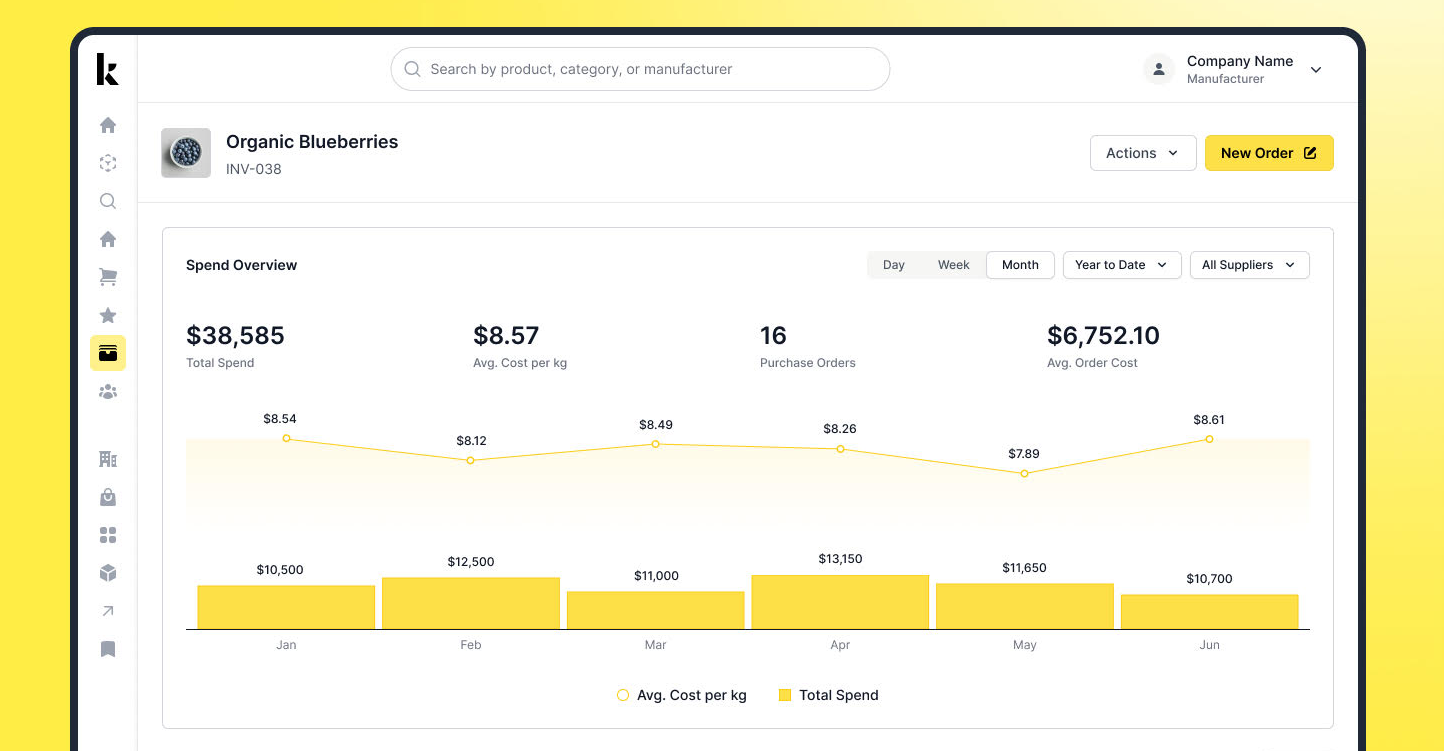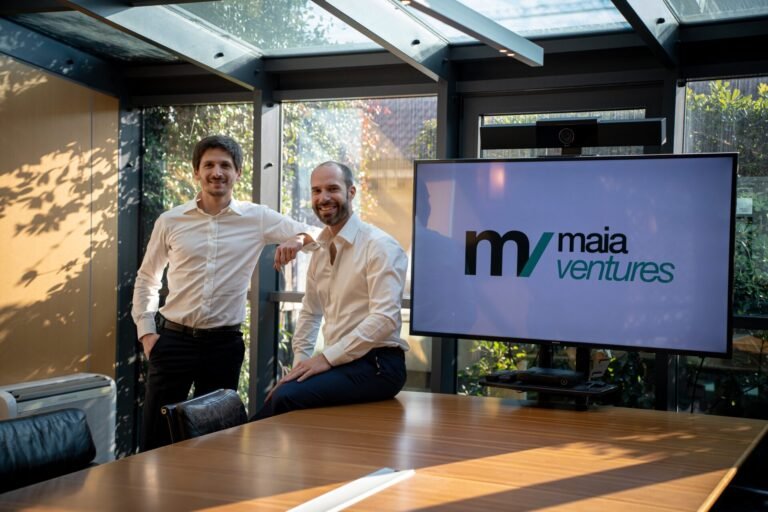AI-powered CPG manufacturing platform Keychain has raised a $30 million Series B round led by Wellington Management and existing investor BoxGroup, alongside other returning investors, bringing its cumulative funding to $68 million 18 months after launch.
The capital injection supports the rollout of KeychainOS, an SaaS-based AI operating system that helps manufacturers manage their production cycle, said the New York-based firm, which now works with leading US retailers including 7-Eleven and Whole Foods and top CPG brands including General Mills.
“We’ve grown quickly because the demand is clear,” said cofounder and CEO Oisin Hanrahan. “Applying AI allows KeychainOS to give manufacturers a smarter, faster way to run their facilities.”
“Keychain is fundamentally redesigning the CPG supply chain.” Molly Breiner, sector lead, Wellington Management
30,000+ manufacturers, 20,000+ brands and retailers
Through its core product—a search and discovery platform through which packaged goods companies and retailers with private label operations can find co-packers—Keychain has built a network of 30,000+ manufacturers and 20,000+ brands and retailers and expanded beyond food into beauty and personal care, Hanrahan told AgFunderNews.
But this is just the beginning, said Hanrahan, who has been building a set of AI-powered workflow tools on top of its platform to help users bring products to market more rapidly.
This includes everything from ingredients and packaging sourcing capabilities to tools replacing food safety auditing software, added Hanrahan, who cofounded home maintenance platform Handy HQ before selling it to Angie’s List (now Angi).
“We haven’t even invested all of the seed round yet, and we still have all the Series A money, plus the business is generating significant revenue at this point. So it’s less about needing money and more about the ambition that we’ve got to build a really important company. For example we want to increase our engineering investment substantially and more than double the number of engineers in the team to somewhere between 70-80 people in pretty short order.”
He added: “We started out on search and discovery for brands and retailers to find manufacturers and we’ve built what we know is the leading product in that category, but we have this bigger vision. We want manufacturers across the country and ultimately across the world, to turn to Keychain to run their to run their facilities.”
‘Our intention is to build out a full operating system’
With KeychainOS, he said, “Our intention is to build out a full operating system, basically the full suite [of tools] from procurement and productivity and production and purchasing to cost accounting, food safety auditing, the entire suite of what manufacturers need to run their business.
“So you’ve got these companies that have built ERP systems historically, but they did it in the era before AI was what it is today. We are building an AI native solution for manufacturers that makes it so much easier to run a facility.”
He added: “If you think about traditional ERP systems with 20 different menus and 14 drop downs and you think about software being built today, it’s much more based on natural language. It’s much more based on automated synthesis [of reports, for example]. So as an example, when it comes to an audit, instead of manually writing up your reports, KeychainOS just does that for you. You can say, give me a written narrative of how we performed over the last quarter so I can include it with my audit, give me a remediation suggestion, and it generates all of that content immediately.”
Rather than layering AI onto existing systems, he said, “We’re talking about truly replacing existing systems.”

‘We’re building the software for them to run their facility’
As an example, he said, a retailer might use Keychain to find a co-manufacturer to make a certain kind of [private label] snack. The manufacturer might then use Keychain’s tools to generate capability decks and go back and forth [with the retailer] over specs and capabilities. It might then use Keychain to identify ingredients or packaging suppliers, and then use Keychain’s food safety audit product to manage compliance with SQF standards and push that data directly to the retailer.
“We’ve gone way past search and discovery; it’s about running your facility. We put the manufacturer at the center of everything we do; we’re building the software for them to run their facility, and as part of that, we allow them to share their data with brands and retailers.”
For ingredients and packaging sourcing, he said, “If a brand or retailer is looking to find a co-packer to make a particular product [a cookie, for example] the more savvy ingredients suppliers can also use Keychain to insert themselves into the conversation. Hey, have you considered this type of flour?
“We can also go to the retailer to say would you like your co-manufacturer to source all the ingredients or are you open to talking to some suppliers that might add value? If they say yes, we’ll make that introduction. The AI is learning from new data every single day, so when a new project is posted, we know from all our data what the likely ingredients are that go into it and it allows us to make suggestions that are reasonable.
“Brands and retailers love it because it’s bringing more transparency and means that a co-manufacturer can’t just say this provider [that it always uses for a given ingredient] is the only one that can supply this ingredient.”
With the MAHA movement putting renewed emphasis on avoiding chemical-sounding ingredients, firms are also using Keychain to find suppliers of clean label ingredients and “get ahead of things,” he said.
A virtuous circle
So where does Keychain’s data come from?
If you’re in the private label sourcing department of a large retailer, for example, Keychain has “already indexed all of your products” from hundreds of sources online, plus some data feeds it has bought, Hanrahan explained in a previous call. It then has its own data models that analyze every product and tag it on a process level and at a packaging level.
“Say you want to find a co-packer for a certain kind of trail mix,” he said. “We use AI to analyze the packaging and the ingredients in the description in order to determine what processing and packaging equipment is needed to manufacture it. We then show you which of the manufacturers on our platform can make it. You can then filter them by certification or location, for example.”
As for information on co-manufacturers, he said, “Most people who come into this start by doing online searches. We did the opposite and started by looking at every single company that’s listed as a private enterprise in the United States. And then we use that data set to identify which ones we think are manufacturers based on the signals we get from NAICS codes [used to categorize companies based on their primary business activity] and all the rest.
“Then from there, we do online data collection, most of it automated, coupled with manual research. We also have relationships with sellers of equipment and machinery who tell us who they’ve sold machinery to, which allows us to enrich the data.”
But ultimately, he says, “What drives more manufacturers to engage on Keychain is the fact that we have so many brands and retailers engaged, and they want to be a part of it. So it becomes a virtuous cycle [as they help Keychain populate its platform].”
Further reading:
CPG manufacturing platform Keychain sees uptick in activity as firms prepare for tariffs
From Handy to Keychain: Angi of CPG tackles biggest pain points in CPG manufacturing
The post Keychain raises $30m Series B, launches AI-powered operating system for CPG appeared first on AgFunderNews.




